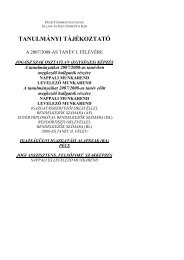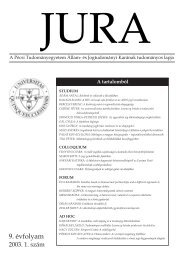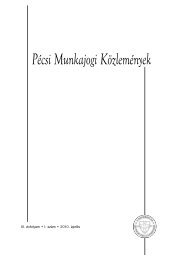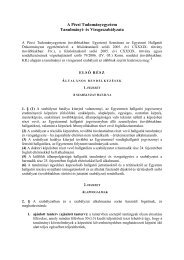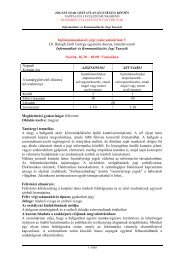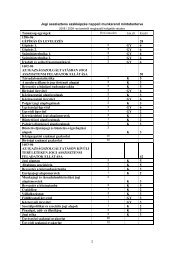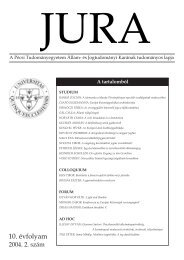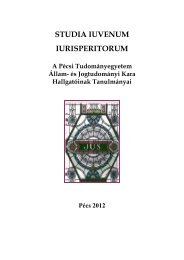2012. évi 2. szám - Jura - Pécsi Tudományegyetem
2012. évi 2. szám - Jura - Pécsi Tudományegyetem
2012. évi 2. szám - Jura - Pécsi Tudományegyetem
- TAGS
- jura
You also want an ePaper? Increase the reach of your titles
YUMPU automatically turns print PDFs into web optimized ePapers that Google loves.
Ulrich Karpen: Migration and Human Rights – Challenges and Chances219Prof. Dr. Ulrich KarpenLaw Faculty, University of HamburgMigration and Human Rights– Challenges and ChancesI am talking to you on some issues of migration andHuman Rights. Let me start by giving you 2 cases.(1) Case. A medical doctor – migrant from an Arabcountry – reports of a recent encounter with the PolicePresident of his city in a West-European country:“There was a phone call from the Police President. Heasked for a dialogue. I did not understand what hewanted. He said often ‘dialogue’ – why didn’t he simplysay: ‘I want to talk to you’? But alright, he wantsdialogue; he did not mention a topic or so, and I answered:‘Of course – we would enjoy Your visit everyday.’ Well – a Police President is not anybody. But heinsisted to get an appointment. I said: ‘I am retired.I am almost every time at the mosque, Wednesday,Friday and Sunday under all circumstances. Come, ifyou have time.’ – He talked lengthily, I cannot recalleverything, and finally he asked sort of timidly: ‘Wewould like to start a dialogue with the whole Muslimparish or community; maybe, that a Friday, before orafter the prayer, would be appropriate.’ Well – whois ‘We’? The Police? And who is the Muslim parish?Our community holds 30 to 40 retired people, who areall Arab doctors or engineers. Well – some are fromTurkey or Iran. Of course, I don’t have any objectionsagainst such sort of a meeting. He should come Fridayat 6 in the evening, I said. And that then – of course –became embarrassing. He talked and talked and wealways heard ‘dialogue’. It was painful because noone of the 25 old men present understood what hewanted. Afterwards I questioned him bluntly, whatthe conversation should be about. We then discoveredthat, in fact, he would like to have a dialogue withthese young people, who around the mosque causeannoyance, make stupid things, nonsense. ‘What dowe have to do with that?’, we asked. And again hestarted: Dialogue with Muslims, there has been for along time no such a dialogue. Dialogue to improvecommon life, friendship. I remained polite, police isimportant and I respect – of course – a Police President.But at one point I had to say quite frankly: ‘Noone of the people who sit here has a problem withdialogue. Nobody. Nobody makes bad things, weall pay our taxes, have employees from this countryand our kids carry diplomas from the city universityand I added: Those young people he referred to havebeen insolent and cheeky to us as well. They are noMuslims, and they don’t go to mosques, particularlynot to ours. And another member of the group madeclear to the policeman that we ourselves are afraidof these young rowdies. Another added that onecannot make a dialogue with these men; one shouldimprison them, that’s it. I think that is necessary forsome of them. Why and how can we start the job ofthe police?”(2) Migration and Human Rights: Second Case. Accordingto the standing rulings of the European Courtof Justice in Luxemburg the European Citizenship isthe “basic status of citizens of EU member states”.The Court in its decisions of last year enlargened therights of individuals emanating from EU citizenship.This development reached a peak in a judgment ofthe Great Chamber of the Court from March of thisyear. The essence of this judgment is the discoveryof a core of EU citizenship, which could be claimedalso from the nation state. The EU citizenship as thecore of individual rights disconnects to a certain extentfrom the member state-citizenship. This is new!To inform you I’ll firstly explain the content of theZambrano Case and then draw some conclusions.What is the matter of the case? Ruiz Zambrano andhis wife – both are citizens of Colombia – stayed inBelgium since 1999 with insecure legal status, afteran unsuccessful asylum procedure. Some applicationsof the couple to legalize their stay failed. Mr.Zambrano worked illegally. During their stay, twochildren were born. The couple omitted to apply forColombian citizenship for their children – obviouslyon purpose. According to Belgian law, the childrenbecame Belgian citizens in order to avoid statelessness.On submission of the case to the EuropeanCourt of Justice by the Tribunal du Travail of Brusselsthe Court granted to Mr. Zambrano a right to legalizehis status and an entitlement to a work permit. TheCourt derived this right of Mr. Zambrano from theEU citizenship of his children (Art. 20 of the Treatyon the Functioning of the European Union). TheCourt argued that the denial of a right to stay forMr. Zambrano would have the consequence that thechildren – both of them EU citizens – would be forcedto leave EU territory in order to not be separated fromtheir parents. If so, the core of EU citizenship of thechildren would be destroyed. In other words: Thirdcountry foreigners, who live illegally in Europe, maystay if their child is an EU citizen and they pay forhis/her maintenance. This is true even if – as in thiscase – the EU citizen never left the country of stay (inthis case: Belgium). This is new, because according toformer decisions of the European Court of Justice EUcitizenship came into action only when the personleft the home country in order to stay or to settle inanother member state. The ratio of EU citizenship,JURA 2012/<strong>2.</strong>



